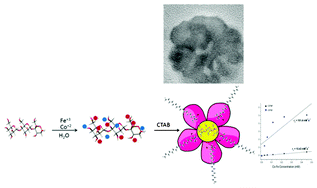Material research has moved from generalization to specificity. Progress of nanoscience from synthesis to application oriented tailored synthesis has generated keen interest in the subject. The electrical and magnetic properties of spinel ferrites is one area of nanoscience that is slowing progress towards application oriented research. In this, CoFe2O4, owing to high magnetocrystalline anisotropy, high coercivity and low to moderate saturation magnetization, has found a variety of applications. Clusters of such nanoparticles are predicted to have revolutionary applications. Herein, we report the designed synthesis of cobalt ferrite clusters with a flower like morphology by employing a starch amylose–CTAB complex as a structure directing agent. The ability of starch amylose–CTAB to assemble nanoparticles from a centric core enabled the enhancement of the cluster diameter, leading to a ten fold increase in the T2 relaxivity when compared to the nanoparticles. The nanoparticles were synthesized from metal–polysaccharide complexes, which led to a narrow particle size distribution, low polydispersity index and positively charged surface, all of which contributed to an enhanced R2/R1 value of 82.43, closer to several commercial products. Using starch as a template, along with a low concentration of CTAB, led to low cytotoxicity and high hemocompatibility. In addition, surface starch could provide easy uptake by stem cells and also be linked to light sensitive motifs for dynamic monitoring with MRI.

You have access to this article
 Please wait while we load your content...
Something went wrong. Try again?
Please wait while we load your content...
Something went wrong. Try again?


 Please wait while we load your content...
Please wait while we load your content...